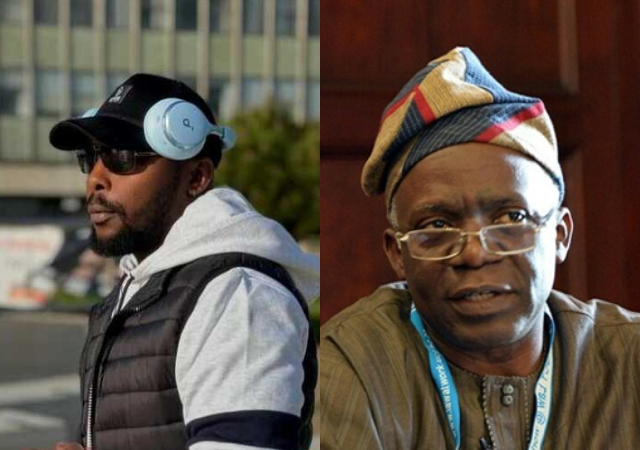Popular media personality Destiny Ezeyim, widely known as Radiogad, has publicly challenged renowned human rights lawyer Femi Falana (SAN) over his recent legal actions. This bold move has reignited discussions about freedom of speech, the role of social media activism, and the complexities of Nigeria’s legal landscape.
The saga centers around a court order obtained by Femi Falana against social media activist Martins Vincent Otse, popularly known as VeryDarkMan (VDM). The order reportedly instructs VDM to remove all defamatory content related to Falana and his son, the popular musician Falz. This legal action has sparked intense debate about the limits of online expression and the power dynamics at play in Nigeria’s digital sphere.
In a video that quickly went viral, Radiogad posed a series of pointed questions to Femi Falana, challenging the motivations behind his legal actions. The crux of Radiogad’s argument revolves around what he perceives as a misplaced focus on VDM, while suggesting that attention should instead be directed towards controversial figure Bobrisky.
“Why is Falana going after VDM and not Bobrisky?” Radiogad questioned, hinting at a potential bias in the legal proceedings. This provocative stance has ignited fierce debates across social media platforms, with Nigerians divided on the merits of Radiogad’s intervention.
Adding fuel to the fire is the recent revelation, that Bobrisky allegedly paid a substantial sum of N15 million to the Economic and Financial Crimes Commission (EFCC) to resolve allegations of money laundering. This information, purportedly captured in a voice recording, has introduced a new layer of complexity to the unfolding drama.
Radiogad’s insistence on shifting focus to Bobrisky raises questions about the priorities of legal action in high-profile cases and the perceived inconsistencies in how different public figures are treated under the law.
One of the most pointed aspects of Radiogad’s critique is his questioning of Falana’s role as a human rights lawyer. Shouldn’t a human rights lawyer be defending the oppressed, not seemingly targeting them?” Radiogad asked, challenging the perceived contradiction between Falana’s professional ethos and his current actions.
This line of questioning touches on broader issues of power, influence, and the responsibilities of public figures in Nigeria’s complex socio-political landscape.
The response to Radiogad’s intervention has been swift and polarized. Social media platforms have been flooded with comments, both supporting and criticizing his stance.
Twitter user @JusticeSeeker24 wrote: “Radiogad is asking the questions we’ve all been thinking. Why the focus on VDM when there are bigger fish to fry?
On the other hand, @LegalEagle55 countered: “Falana has every right to protect his reputation. Being a human rights lawyer doesn’t mean he should tolerate defamation.
The hashtags #JusticeForVDM and #FalanaExplain have been trending, reflecting the intense public interest in this unfolding controversy.
This controversy also highlights the evolving nature of activism in Nigeria. Social media has become a powerful tool for citizens to voice their opinions and challenge authority figures. However, it also raises questions about responsibility, accountability, and the potential consequences of online actions.
Femi Falana’s involvement adds a significant layer to this controversy. As a respected human rights lawyer with a long history of defending the oppressed, his actions in this case have surprised many.
This case goes beyond a simple dispute between public figures. It touches on fundamental issues of free speech, the power of social media, and the evolving nature of public discourse in Nigeria.
1. **Legal Precedent**: How this case is resolved could set important precedents for how defamation laws are applied in the digital age.
2. **Media Responsibility**: It raises questions about the responsibilities of social media influencers and the potential consequences of their actions.
3. **Power Dynamics**: The controversy highlights the complex power dynamics at play between established figures like Falana and emerging social media personalities.
4. **Public Trust**: The outcome of this case could impact public trust in both the legal system and in public figures who claim to represent the interests of the common man.
As this story continues to unfold, several questions remain:
– Will Falana respond publicly to Radiogad’s challenges?
– How will this controversy affect VDM’s online activism going forward?
– Could this case lead to new legislation or guidelines governing social media conduct in Nigeria?
– Will other public figures be emboldened to take similar legal action against online critics?
The clash between Radiogad, VDM, and Femi Falana represents more than just a celebrity spat. It’s a microcosm of the larger struggles playing out in Nigerian society – struggles over free speech, accountability, and the evolving role of social media in shaping public discourse.
As Nigeria continues to navigate the complex terrain of digital activism and its legal implications, cases like this will undoubtedly play a crucial role in shaping the future of online expression and accountability in the country.
Whether this controversy leads to meaningful change or simply fades into the background of Nigeria’s ever-churning news cycle remains to be seen. But one thing is certain: the questions raised by Radiogad’s bold challenge to Femi Falana will continue to resonate in the minds of many Nigerians, as they grapple with the delicate balance between free speech and personal reputation in the digital age.
In a nation where the voices of the people are increasingly amplified through social media, the resolution of this case may well set the tone for the future of online activism and legal accountability in Nigeria. As the country watches and waits, the implications of this high-stakes confrontation between old guard and new media continue to unfold, promising to shape the landscape of Nigerian public discourse for years to come.








 (@radiogad)
(@radiogad)